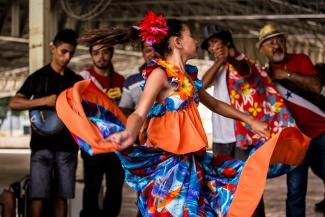


IPHAN Strategic and operational planning for 2006 to 2015
The process designed to improve IPHAN’s strategic and operational planning process gained impetus in 2006 when some strategic meetings were held by its management committee and professionals from different sectors of the institution. The discussion process was completed in 2010, when its new strategic framework was formulated. The aim of the whole process was to improve IPHAN’s internal and external coordination, enhance its operational planning capacity and formulate work proposals involving its different departments around the following thematic areas:
Some programmes deserve special attention:
Review of IPHAN’s multi-year plan (Brazil Cultural Heritage);
Creation of a system to monitor the execution of IPHAN’s strategic and operational plan, which since 2008 has counted on the collaboration of management consultants, who have made decisive contributions to the management of the actions set forth in the strategic plans and the review of the multi-year plans;
Creation of the Growth Acceleration Programme (PAC) for Historic Towns (in 2009) as a result of the review of the integrated plan for the Brazilian Historic Towns programme. The PAC for Historic Towns is designed to boost growth in Brazil’s historic towns and cities, constituting an intergovernmental, cross-disciplinary initiative involving different tiers of government (federal, state, municipal) and educational establishments.
The PAC for Historic Towns follows on from the Monumenta programme, funded by the Inter-American Bank, and aims to revitalise Brazil’s historic town centres by modernising their infrastructure and encouraging a broader understanding and appreciation of their heritage, enabling new economic, social and cultural uses for the restored sites until then under the exclusive responsibility of the Ministry of Culture.
Mission, Vision and Strategic Challenges of IPHAN for 2010-2015:
Mission – to promote and coordinate the preservation of Brazilian cultural heritage to strengthen identities, assure access to memory and contribute to the socioeconomic development of Brazil.
Vision – to coordinate the cultural heritage policy and National Cultural Heritage System (laws and public policies for the preservation of the nation’s cultural heritage), regulating the guidelines and rules for preservation measures and coordinating the preservation initiatives by municipal, state and federal government entities; to create a funding system that strengthens institutions and the system as a whole and consolidates actions capable of identifying, producing and divulging benchmarks for the preservation of cultural heritage on a national and international level, improving the skills of the institution’s employees in order better to meet the demands of society.
Strategic challenges for 2010-2015:
To introduce and consolidate the National Cultural Heritage System, thereby improving internal synergies between the actions taken by IPHAN;
To consider IPHAN’s culture and planning practices to ensure the continuity of strategic plans and actions at every level in order to make the services offered to the population more effective;
To help make culture a strategic element of a new development model for the country by applying the broad concept of cultural heritage to the actions of IPHAN and coordinating cultural heritage preservation with other public policies;
To formulate and implement an information and document management policy to improve the information infrastructure and thereby the integration of IPHAN’s actions and broaden dialogue with society by offering improved access to knowledge and information about cultural heritage; and
To consolidate and improve IPHAN’s organisational structure, focusing on training and people management, adapting the workforce quantitatively and qualitatively to the needs of each state, modernising its management practices and improving coordination between the technical, administrative and legal areas.
Current state of the Brazilian economy and impacts on the national cultural policy:
The Ministry of Culture budget has been reduced by 21% from 3.3 billion reais (around 950 million euros) to 2.6 billion reais (around 750 million euros);
The budget of the Growth Acceleration Programme (PAC) for Historic Towns has been cut from 170 million reais (around 49 million euros) to 115 million reais (around 33 million euros);
Outsourced professionals and trainees working at several institutions linked to IPHAN have been laid off;
There are uncertainties about the future of the new Culture Incentive Law (Rouanet law), which could further affect investments in cultural projects because of the adjustments proposed for Procultura (the national funding programme for culture), which modify the criteria for distributing funds from tax relief programmes. Now, the funds must be distributed between the five regions of Brazil in direct proportion to the relative population of each region (as a percentage of the total population of the country). The new law also proposes that 2% of the amount invested should go into a National Culture Fund, forcing project managers to find more sponsorship to make their cultural projects feasible. All these changes to the law coupled with the poor performance of the national economy have led to a fall-off in investments in culture, with an impact on publishing projects (5.16% down on 2013), national and international exhibitions, restoration works for national heritage, concerts, dance, theatre and film productions, etc.
Continue reading Mapping Brazil - Heritage: Rio de Janeiro and Belo Horizonte